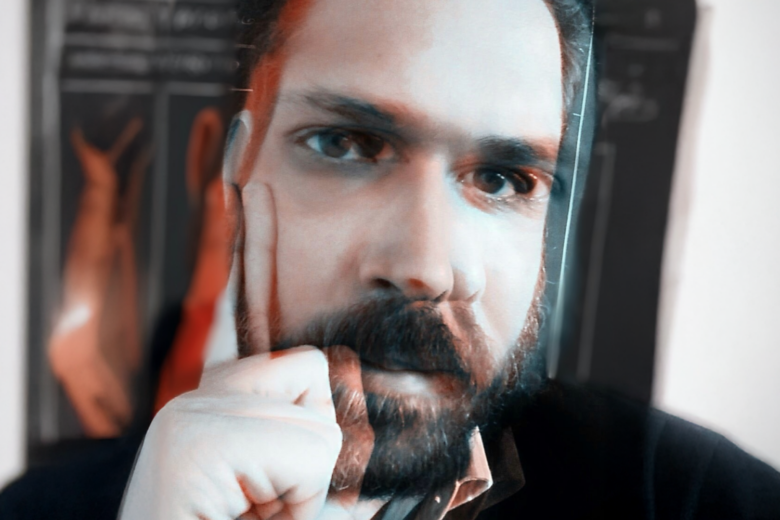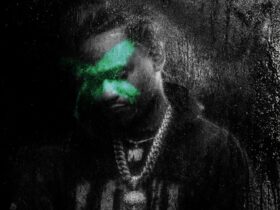Music, at its most meaningful, serves as both mirror and window — reflecting our inner landscapes while offering glimpses into realms beyond ordinary perception. Few contemporary artists embody this duality more completely than Giuseppe Bonaccorso. The Italian-born composer emerges as a distinctive voice — one that somehow manages to marry technical precision with raw artistic innovation. Born in the picturesque town of Caltagirone, Italy, back in 1979, Bonaccorso has carved out a path that simply refuses to be neatly categorized. He’s embraced his seemingly disparate roles as classical guitarist, composer, and poet with a passion that’s as genuine as it is infectious.
Bonaccorso’s journey isn’t what you’d expect. There’s something almost contradictory in how he balances cold technical expertise with fiery creative exploration. With roots firmly planted in Electronics Engineering and later branching into Business Administration and Data Science (yes, really), he initially chased a career that seemed light-years away from where he now stands. After climbing the corporate ladder to high-level managerial roles, something changed — he took the leap that many dream of but few dare to attempt, walking away from security to throw himself headlong into the uncertain worlds of music and poetry.
“Art isn’t built on islands,” Bonaccorso explained, thoughtfully considering his words. “It’s more like… it’s the most extensive continent, where anyone can wander from land to land without hitting borders.” He paused, searching for the right words. “It’s a kind of spiritual journey, you know? Moving from one creation to the next, pushing out your mental boundaries until you maybe — just maybe — touch something like real awareness about why we’re all here.”
His musical story began — as these things often do — with a moment of clarity. After witnessing mind-blowing performances by classical guitar titans John Williams and Eliot Fisk, he did something that made his friends think he’d lost his mind: he sold his perfectly good electric guitar (dismissing it as “almost useless”) and bought a cheap classical one instead. Like many musicians, he started by teaching himself, fumbling through those early days of callused fingertips and frustrated practice sessions. It didn’t take long before he hit a wall, though. “I understood I needed to take more serious lessons,” he admits with the slight wince of someone remembering their own naivety. This led him down a rabbit hole of studying under various masters, working through everything from Bach’s mathematical precision to the twentieth-century innovations of Leo Brouwer and Heitor Villa-Lobos.
What sets Bonaccorso apart in today’s overcrowded scene isn’t just talent — it’s his stubborn, almost defiant rejection of mainstream patterns and structures. When most artists are chasing streams and algorithm-friendly hooks, he’s heading in the opposite direction. “I consider myself a countercultural artist,” he says with a slight shrug that somehow communicates both humility and absolute conviction. “I create music through original compositional processes that are never — and I mean never — tied to mainstream culture.”
If you actually sit with his compositions, you’ll notice how they not only embrace atonality but seem to revel in it. His experimental techniques aren’t just artistic choices but reflect a deeper philosophy that flat-out rejects the very idea of limitations in musical expression. This stubbornly independent approach has resulted in a body of work that sprawls across multiple instruments — from his beloved classical guitar to string ensembles and piano — while frequently incorporating synthesized sounds that create an unexpected dialogue with more traditional instrumentation.
When the conversation turned to how challenging some listeners might find his music, Bonaccorso acknowledged this reality. “Unfortunately, mainstream culture is very closed,” he said, “and too many listeners are used to specific patterns.” He reflected for a moment. “Whenever those familiar patterns aren’t there, somebody might feel ‘lost’ and just… stop listening.” He added, “This is always a shame, not only for me.” Rather than watering down his vision, however, he encourages listeners to push past their comfort zones, insisting that the most meaningful musical experiences often wait just beyond those comfortable, well-worn paths. “My advice? Look around. Don’t get stuck with one genre thinking all other music will be useless once you’ve found something pleasant.”
Bonaccorso isn’t content to limit himself to just one artistic lane. His creative restlessness has led him far beyond music into the realm of poetry, where he’s quietly built an impressive resume. He’s published several books over the years and picked up a handful of awards along the way for what critics have described — somewhat cryptically — as his “hermetic and colorful style.” (I spent an afternoon with some of his poems, and “hermetic” only begins to scratch the surface.)
The fascinating thing is how these different artistic expressions aren’t separate pursuits but rather different dialects of the same language. You can hear this most clearly in compositions like “Inno A Satana,” which draws direct inspiration from the 19th-century Italian poet G. Carducci. This particular track, which appears on “Enemies in Love,” offers perhaps the clearest window into how Bonaccorso’s literary and musical minds engage in constant conversation.
Bonaccorso’s latest album, “Enemies in Love,” dropped on February 16, 2025, and it’s not exaggerating to call it his most ear-catching work yet. It’s the kind of album that demands — rather than requests — your full attention. What struck me most during repeated listens was how the collection tackles the age-old duality of good and evil, but through such a distinct avant-garde, almost metaphysical lens that it feels entirely fresh. Throughout its brief but complex runtime, Bonaccorso constructs layer upon layer of experimental sound textures, building a complex narrative that’s both disorienting and strangely compelling. The album’s conceptual heart — that opposing forces are actually deeply interconnected, enemies who are, quite literally, madly in love with each other — unfolds gradually with each track.
There’s something alchemical about how the album blends elements of classical composition with alternative soundscapes and those haunting choral arrangements that seem to float in from another dimension entirely. What’s most surprising is that even as “Enemies in Love” challenges basically every conventional musical boundary through its atonal explorations and frankly bizarre structures, it somehow maintains an emotional core that hits you right in the chest. That is, if you’re willing to venture beyond your Spotify-algorithm-approved playlists.
The album includes the oddly meditative “Pater Noster”, the intentionally complex “Interlude à la Folie” (which lives up to its name, bordering on madness), and the provocative “Inno A Satana.” This last track, drawing directly from Italian poet G. Carducci’s controversial work, might raise some eyebrows, but that seems to be exactly what Bonaccorso is aiming for.
“Enemies in Love” is currently available on SoundCloud, and it offers exactly the kind of bold, genre-defying experience that’s increasingly rare in today’s hyper-categorized music landscape. Although critical reception has been limited (as is often the case with truly experimental work), those who have engaged with it note how the album represents a significant evolution in Bonaccorso’s already-uncompromising approach, further cementing his position as a vital, if underappreciated, voice in contemporary avant-garde composition.
Looking ahead, Bonaccorso discussed what might be his most ambitious project yet — a musical journey through literature’s most famous vision of hell. “I’m composing a soundtrack for Dante’s Inferno,” he revealed with evident enthusiasm. “I’m starting right at the beginning, you know, standing nervously in front of that terrifying gateway, and following all the way through to Dante’s final conclusions.” He elaborated, “What I really want to do is capture each character’s essence — their particular flavor of torment or redemption — through distinct musical themes. Probably lots of strings, piano, and guitar… but who knows where it’ll take me once I really get into it.”
I asked him point-blank what he hopes people actually get from his music — especially given how challenging it can be. His answer wasn’t what I expected. Rather than some lofty artistic manifesto, Bonaccorso emphasized connection. “I want to communicate specific elements,” he said, his voice softening. “You see them first in the titles, and then they’re hidden — like little secrets — in the music itself.” He continued, “I want to reach listeners without any… how do you say… ‘distortions’? And hopefully find that open door into their experience.” He added with a brief pause, “That’s the hard part, isn’t it?”
This focus on communication reveals an artist who, despite his experimental tendencies, remains concerned with connection rather than purely abstract expression. It suggests that beneath the atonal structures and unconventional compositions lies a fundamentally human impulse to share experiences and perceptions.
Bonaccorso represents a particular strain in contemporary music—one that values innovation and personal expression over commercial appeal or accessibility. His work challenges listeners to move beyond passive consumption toward active engagement with sound and structure.
Through his continuing explorations across multiple artistic disciplines, Giuseppe Bonaccorso invites audiences to experience art as he does: as a boundless continent waiting to be traversed, with each new work offering fresh perspectives on human existence and experience.
For those brave souls looking to step outside their musical comfort zones, Bonaccorso’s work awaits on Spotify, SoundCloud, YouTube, X, and Instagram. For a deeper dive into his creative universe, visit his website at bonaccorso.eu. Fair warning: you won’t find any three-minute pop songs, but you might just discover something altogether more interesting.












